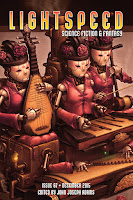
(Space opera; Sun Lords of the Principality) Mere, an executioner android of the Principality, becomes curious about its barely-remembered past, putting itself in danger. (6,683 words; Time: 22m)
Rating: ★★☆☆☆ Not Recommended
"Tomorrow When We See the Sun," by A. Merc Rustad [bio] (edited by John Joseph Adams), appeared in Lightspeed Magazine issue 67, published on December 3, 2015.
Mini-Review (click to view--possible spoilers)
Pro: The universe ruled by godlike "Suns" seemed very interesting.
Con: This story is neither SF nor Fantasy. The author mixes the tropes of both, but without great success. People have souls and life forces. There are sorcerers. The science is very poor. Things can be at "zero kelvin," there are "gas whales" in space. The result is something that makes it impossible to sustain suspension of disbelief for more than a few paragraphs at a time.
None of the characters behaves in a rational fashion. Mere shouldn't have fears, if it's a machine. Why does Century care so much about a thing? Why did Kitshan love a thing? Why do the Sun Lords destroy entire planets over trifles? How are there any planets left? As a result, we feel nothing for any of the characters.
The plot is entirely driven by new information, so we never have any idea what might come next. For example, we don't know that Mere will have to fight crabs until it does, and even then we have no idea if this will be a hard or easy fight. This means there's zero suspense in the story.
Other Reviews: Search Web, Browse Review Sites (Issue 67)
A. Merc Rustad Info: Interviews, Websites, ISFDB, FreeSFOnline
Follow RSR on Twitter, Facebook, RSS, or E-mail.
Con: This story is neither SF nor Fantasy. The author mixes the tropes of both, but without great success. People have souls and life forces. There are sorcerers. The science is very poor. Things can be at "zero kelvin," there are "gas whales" in space. The result is something that makes it impossible to sustain suspension of disbelief for more than a few paragraphs at a time.
None of the characters behaves in a rational fashion. Mere shouldn't have fears, if it's a machine. Why does Century care so much about a thing? Why did Kitshan love a thing? Why do the Sun Lords destroy entire planets over trifles? How are there any planets left? As a result, we feel nothing for any of the characters.
The plot is entirely driven by new information, so we never have any idea what might come next. For example, we don't know that Mere will have to fight crabs until it does, and even then we have no idea if this will be a hard or easy fight. This means there's zero suspense in the story.
Other Reviews: Search Web, Browse Review Sites (Issue 67)
A. Merc Rustad Info: Interviews, Websites, ISFDB, FreeSFOnline
Follow RSR on Twitter, Facebook, RSS, or E-mail.
No comments (may contain spoilers):
Post a Comment (comment policy)